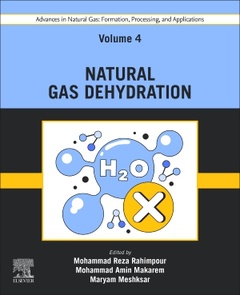Description
Advances in Natural Gas: Formation, Processing, and Applications. Volume 4: Natural Gas Dehydration
Coordinators: Rahimpour Mohammad Reza, Makarem Mohammad Amin, Meshksar Maryam
Language: English
Subjects for Advances in Natural Gas: Formation, Processing, and...:
352 p. · 19x23.3 cm · Paperback
Description
/li>Contents
/li>Biography
/li>Comment
/li>
Advances in Natural Gas: Formation, Processing, and Applications is a comprehensive eight-volume set of books that discusses in detail the theoretical basics and practical methods of various aspects of natural gas from exploration and extraction, to synthesizing, processing and purifying, producing valuable chemicals and energy. The volumes introduce transportation and storage challenges as well as hydrates formation, extraction, and prevention. Volume 4 titled Natural Gas Dehydration introduces in detail different natural gas dehydration methods. The book covers absorption with different solvents such as glycols, ionic liquids, and DES which is one of the important dehydration techniques, as well as natural gas dehydration with adsorption-based technologies utilizing various materials including zeolites, carbonaceous sorbents, metal oxides, etc. It discusses in detail membrane-based processes with various types (such as hollow-fiber and polymeric membranes) and includes novel technologies for sweetening natural gas by using supersonic technology.
Preface Acknowledgments About the Editors SECTION 1. Natural Gas Dehydration Concepts 1. Introduction to natural gas dehydration methods and technologies 2. Challenges of wet natural gas 3. Environmental Challenges of Natural Gas Dehydration Technologies SECTION 2. Absorption Techniques for Natural Gas Dehydration 4. Glycol absorbents for natural gas dehydration 5. Ionic liquids for natural gas dehydration 6. Deep eutectic solvents for natural gas dehydration SECTION 3. Adsorption Techniques for Natural Gas Dehydration 7. Swing processes for natural gas dehydration: pressure, thermal, vacuum, electrical and mixed swing processes 8. Carbonaceous sorbents for natural gas dehydration 9. Zeolite and molecular sieves for natural gas dehydration 10. Metal-oxide adsorbents and mesoporous silica for natural gas dehydration SECTION 4. Membrane Technology for Natural Gas Dehydration 11. Hollow-fiber membranes for natural gas dehydration 12. Zeolite membranes for natural gas dehydration 13. Polymeric membranes for natural gas dehydration SECTION 5. Other Technologies for Natural Gas Dehydration 14. Supersonic technology for natural gas dehydration
Prof. Mohammad Reza Rahimpour is a professor in Chemical Engineering at Shiraz University, Iran. He received his Ph.D. in Chemical Engineering from Shiraz University joint with University of Sydney, Australia 1988. He started his independent career as Assistant Professor in September 1998 at Shiraz University. Prof. M.R. Rahimpour, was a Research Associate at University of California, Davis from 2012 till 2017. During his stay in University of California, he developed different reaction networks and catalytic processes such as thermal and plasma reactors for upgrading of lignin bio-oil to biofuel with collaboration of UCDAVIS. He has been a Chair of Department of Chemical Engineering at Shiraz University from 2005 till 2009 and from 2015 till 2020. Prof. M.R. Rahimpour leads a research group in fuel processing technology focused on the catalytic conversion of fossil fuels such as natural gas, and renewable fuels such as bio-oils derived from lignin to valuable energy sources. He provides young distinguished scholars with perfect educational opportunities in both experimental methods and theoretical tools in developing countries to investigate in-depth research in the various field of chemical engineering including carbon capture, chemical looping, membrane separation, storage and utilization technologies, novel technologies for natural gas conversion and improving the energy efficiency in the production and use of natural gas industries.
Dr. Mohammad Amin Makarem is a research associate at Shiraz University. His research interests are gas separation and purification, nanofluids, microfluidics, catalyst synthesis, reactor design and green energy. In gas separation, his focus is on experimental and theoretical investigation and optimization of pressure swing adsorption process, and in the gas purification field, he is working on novel technologies such as microchannels. Recently, he has investigated methods of synthesizing bio-template nanomaterials and
- Introduces natural gas dehydration concepts and challenges
- Describes various absorption and adsorption processes for natural gas dehydration
- Discusses novel methods for natural gas dehydration including membrane and supersonic technologies
These books may interest you

Sour Gas and Related Technologies 222.68 €



